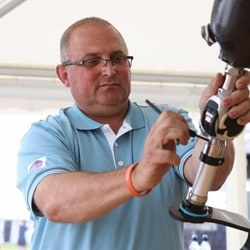Trade Thoughts: Do mobility products have a place online?
The sale of mobility products online has become a bone of contention in the industry, with opinions often split regarding whether it is right to let customers buy these products virtually.
Ecommerce can help to open up the market, giving consumers freedom to seek out lower prices, and discover products that may not be available locally, but with this comes safety concerns and frustrations over consumers receiving assessments, only to seek out lower prices online. THIIS asks leaders from the mobility retail and supply sectors about their views on this topic.
All thoughts were submitted to THIIS in April 2021.
Karen Sheppard, Managing Director of People First Mobility
“Living aids? Yes. Mobility scooters? Not without some kind of assessments or training.
The world of ecommerce has changed in the last year during COVID and lockdowns, with more people going online to buy. Online shopping may still see an increase for a while, however, more people may also like to venture out to the stores as a change. We will have to wait and see how customers choose to shop over the next few months.
“We are currently building an online store for daily living aids and consumables. The sale of mobility scooters online is still something we are discussing and seeing how to sell these online with assessments, questionnaires or videos as a guide before a purchase can be made.
“Online box shifters of scooters with no request for any of the user details or any instructions on usage contributes to accidents and fatalities each year. Some people do come in store and test them, get assessed and then buy online so we are looking at ways to encourage the customer to buy from us.
“One idea for online sales of scooters is possibly for online dealers to either take out the products and do an assessment or perhaps for the suppliers to get involved. They could take leads from online sellers, give them a referral fee and go to the customer, giving the assessments needed.”
Alastair Gibbs, Managing Director of TPG DisableAids
“Increasingly, the sale of mobility products online has been a bone of contention in the industry. Opinions are often split regarding whether it is right to let customers buy these products virtually.
“On one hand, the world of ecommerce opens up the market, giving consumers freedom to seek out lower prices, and discover products that may not be available locally.
“On the other, safety concerns regarding the purchase of medical devices without the correct assessment; a growing race-to-the-bottom scenario; and frustrations over consumers receiving assessments, only to seek out lower prices online are common.
“Without doubt, all businesses require an online presence, but not necessarily as a sales device, more of a shop window through which potential customers can look. They can gain the knowledge of what is available and they can make comparisons of specification and performance. They can perhaps get a feel for the expected cost to acquire such items. But they should only be able to buy non-prescriptive, non-assessed small aids from that shop.
“For all other assessed products, a face-to-face assessment of their needs, capabilities and expectations should take place. This does not necessarily mean they have to visit a retail premises, that assessment could be carried out at a home visit by a trained and competent assessor.
“The risk to the end-user of incorrect specification can be severe and create lifelong issues. The further risk to the wider public is equally important due to the nature and size of some mobility products that can be extremely dangerous in the wrong hands.”
Billy Finnie, Operations Manager of Mobility Scotland
“Most of us appreciate the benefits of online purchasing. It has introduced a new dimension to the way we shop and opened up hitherto difficult to access markets; freedom and choice is the mantra of the western world. However, some products, such as complex mobility and motorised products, unequivocally do not fit within an online model.
“These high value, high impact mobility products firmly sit in the speciality categories and can only make the difference people think they will if there is a greater degree of best practice, suitability testing and needs analysis. In other words, it needs industry regulation.
“Competition in every industry is, of course, healthy, but not at the risk of consumer safety and poor value for money, or the industry being dragged deeper into that negatively perceived world where public resentment has grown over the last decade because of ill-advised product purchases. These might be products which are lying unused in garages and sheds across the country or inadequately fitted stairlifts that pose a daily hazard, or they could be as a result of poor customer service and support, or an ambiguous returns policy.
“Regulation will strike at the heart of these issues, ensuring protection and benefit for the consumer and businesses whilst developing positive, economic growth. There is room for both models but on a level playing field with relative operational costs, which will naturally level out retail pricing and higher industry standards, all bound together through regulation.”
Richard Holland-Oakes, Managing Director of Recare
“Firstly, Recare does not supply e-commerce yet. Wheelchairs classify as medical devices by the MHRA. Clients’ needs must to be advised by a skilled professional for sizing of the product and to understand functionality maximising their quality of life and independence. To achieve this, selling entirely online isn’t possible.
“For instance, there is a ‘start from’ pricing structure – products with configurations unique to a client’s specifications. When needs are complex, they often require multiple visits to assist, advise, adjust and replace parts where obligated under warranty.
“Online information is confusing to the client due to the quantity of products, capability, functionality, and specifications for product ranges, and whether it is capable or best suited for them. There are ever-evolving products and technologies, and an extensive understanding of products is needed. This expertise cannot be replaced by online shopping.
“Those vulnerable in society favour a personal approach sales, service and repair of their products, independence and access to increased mobility. They favour picking up the phone to specialists.
“There is an active price war online. It is unsustainable long-term, discredits quality products and questions industry ethics. Sustainable growth is essential for business. Internet development should be careful and maintain integrity. “Turnover is vanity! Profit is sanity!”
Ceri Dixon, Marketing Manager for Ableworld
“Ableworld have always been of the same opinion: that mobility products should be provided that are suitable for the recipient’s safe use and therefore many products shouldn’t be available to purchase over the internet.
“As an ethical trader, we strongly believe that larger pieces of mobility equipment, such as scooters, wheelchairs, riser recliners and beds, should be assessed to ensure the customer can use the equipment safely and it will benefit them.
“We understand the world is changing daily and the internet is more convenient for many people, however, as a responsible retailer, we would much prefer for our customers to talk to a member of staff about their requirements so we can offer them advice, not just deliver a box to their doorstep and have them struggle.
“How do online retailers know that someone purchasing a mobility scooter online doesn’t have sight problems? What if that person was to use their scooter and injure themselves or someone else?
“Some smaller items, we agree can be purchased online if they do not need an assessment so we offer the option on our website, if this is more convenient for our customers.”
Gino Farruggio, Sales Director – Trade of Stiltz
“For products which require customisation of the home environment or which need to be configured for the use of an individual, it is imperative this is done using face-to-face consultation.
“Stiltz Homelifts has always been a pioneer in the use of digital marketing to drive customer acquisition. The company’s website has been optimised to ensure greatest visibility against our chosen search terms and to encourage visitor engagement. We continue to seek effective and measurable digital solutions to bring our products to new audiences.
“The internet as a ‘shop window’ is great for the mobility or home accessibility customer when it enables them to research products and suppliers and to choose equipment that fits with their needs. The customer can also, at this point, decide whether to engage with the manufacturer directly or with a local retail representative.
“Alongside this however, we recognise the customer needs to be aware that the purchasing of a homelift is a bespoke consideration and one or more home visits by a consultant will be needed for the purposes of costing as well as for determining end-user need.
“When dealing with vulnerable customers, the imperative has to be safety first and this means in-home assessments.
“Notwithstanding professional installation, considerations such as providing usage instructions to the customer once their product has been installed or explaining of servicing, warranties and maintenance contracts, also need to be addressed. This process cannot be short-circuited by end-user-led online purchases. The risks are just far too great.”
Matthew James, Director of Precision Rehab
“While buying products such as wheelchairs and scooters online may drive prices down, users can often be left high and dry when it comes to customer support with regards to servicing and repairs, which are so important as many rely on their product for their daily independence.
“Without meeting face-to-face, it is impossible to conduct a full assessment to ascertain if the product is suitable for the user, their environment and if they can use it safely.
“It can also have a negative effect on our industry. When we go out to visit a client, we undertake a full assessment, which involves ensuring it is the correct product and can be used safely. For powerchair users, the correct posture is vital and as part of the assessment, they are carefully measured to ensure they have the optimum postural support and comfort.
“We also take the time to find out more about their daily routine such as attending school or their work environment. However, this can enable clients to potentially source the same product online at a reduced price as the supplier will not have incurred the overheads involved in carrying out such detailed assessments and there is often no service back up once the product has been delivered.
“Of course, aids for daily living such as grab handles, walking sticks, jar openers etc. are ok to buy online but without a trial, the consumer will still not know if it will work for them until it arrives.”
Rob Henshaw, Managing Director of Quest 88
“During lockdown, Quest saw a big impact on equipment provision to vulnerable children and a lot of this was due to the healthcare system diverting resources to tackling COVID-19.
“Quest decided midway through lockdown to do something it has never done before and that was to make Kaye Walkers, a widely used Class 1 medical device, available online for parents and carers to buy direct on a fast-track basis, at a lower cost due to no assessment being involved.
“The premise is that assessment is not always required for the Kaye Walker as children move from one size to another. There is one key measurement needed and we suggest that a health care professional is part of the recommendation process.
“The ability for parents to acquire these products online is important to enable equipment to reach parents in good time when the healthcare system is under duress – not just during pandemics but also when the regional foundations exhaust their own funding.
“Remember that there is no national budget for children’s equipment and no legal requirement for the government to provide a walker, standing frame or sleep system. Enabling ‘selective’ online purchasing also alleviates cost to the NHS, especially when parents can afford to buy their own equipment.
“Online purchasing also enables parents to have new equipment, as all too often they receive fourth, fifth or sixth hand equipment from community stores, which visually, and sometime functionally-wise, is not at its best. If done well, ecommerce offers benefits to the child, the parent, the physio and the NHS as a whole.”
Rebecca Bateson, Marketing & Digital Executive for Electric Mobility Euro
“Selling without an assessment structure, online or not, can lead to issues for retailers and consumers. Mobility products do have a place online to demonstrate and promote the expertise of great local retailers. The internet has grown to become an essential research tool for our demographic of customers who have become more confident and trusting of the internet during lockdown.
“The brand awareness and engagement opportunities available online can enhance your showroom experience. Virtual guidance, video promotion and interactive tools can elevate your company and set you above competitors. It’s not all about price! I believe online marketing should work in harmony with in-store support, using your website and social media channels as a ‘shop window’ to attract customers and drive traffic to a physical showroom for those essential assessments.
“Online can facilitate an appointment system, virtual support and customer testimonials, whereas in-store benefits from facilities, product testing and a personal sales advice. A post-lockdown landscape may see a new shopping experience that favours online for convenience but a national desire to support the local community and economy has also gained momentum, which should be capitalised.
“Many of Electric Mobility’s authorised network of retailers have embraced change and proactively demonstrated throughout the pandemic that they can successfully blend the two and it doesn’t have to be one or the other.”
Darren Legg, Sales Manager (UK & Ireland) for DIETZ Power
“Ecommerce certainly brings a whole array of benefits for suppliers and customers alike. For suppliers, they can often showcase a wider selection of products than they can typically do in a showroom environment. It also gives the opportunity to meet a much wider audience than they would do with their local or regional showroom coverage. For customers, the potential ease of purchase and the likely cost-saving often associated with ecommerce makes this a very interesting proposition for them.
“However, for anything that is not a straightforward daily living aid and has some form of complexity to it, there are many pitfalls and potential dangers to selling and purchasing via ecommerce. More complex products should always involve an assessment of suitability for the customer and the environment they are using it in. There should also always be training given to the customer on how to safely use the product they have purchased.
“Unfortunately, as pricing becomes the main feature of ecommerce, often complex products will be sold at vastly reduced prices which ultimately ends up with a customer unknowingly reducing the level of sales and after sales service levels they should expect from the supplier.”













